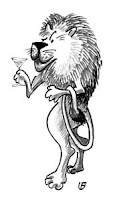Schmusekatze combines the verb schmusen (to snuggle, cuddle) with Katze (cat). It denotes someone who likes to snuggle with or cuddle another person, possibly as prelude to other activities with that person.
It’s interesting to compare German schmusen and Yiddish schmooze, which are clearly related. But they differ in meaning: Schmooze is all talk, while schmusen is all action—talking would break the mood.
Note on pronunciation. Four distinct syllables: SHMOO·zeh·katt·seh. The main stress is on the first syllable, the third one gets a secondary stress.
[Source: Wild Things in the German Language: Kindle version | iBook version]
Presence Out of Context/Underworld
1 week ago






